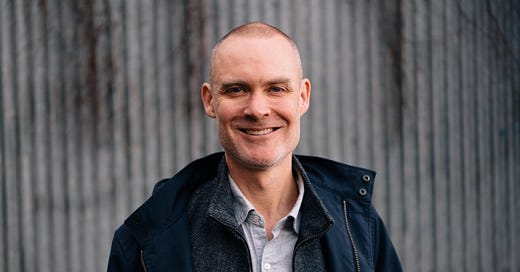GUEST POST - The Necessity Of Music In Small Communities
Fostering and Sustaining Big Dreams In Small Towns
As part of Making Places Better, I want to feature guest voices & opinions. This one is from Piers Henwood, founder of Amelia Artists & Amelia Recordings.
Let me know what you think in the comments - Shain
Now, over to Piers.
In his famous ode to New York City, Frank Sinatra sang, "If I can make it there, I'll make it anywhere."
Moving to the big city to make it big is part of our cultural folklore, especially in entertainment. The great cities inspire our imagination and allow us to measure ourselves against the best in any business. But what about those artists and industry professionals who live in smaller cities, far from the allure of New York, Los Angeles, Toronto, or London? Does this geographical decision decrease their chance of success? If so, is it potentially valid for some individuals to accept a lesser chance of hyper-success in order to support music and arts in a smaller community?
The arts present a difficult lens for these questions because society implicitly requires audience validation to bestow importance on art. Often great art naturally begets a big audience, but a big audience also confers validation back to the subjectivity of art. It's a circular and self-reinforcing relationship.
I have a theory that the relationship between arts and geography, therefore, is better answered by thinking about a different type of professional geography – a doctor in a small town.
Like the artist who moves to the big city, there is also significant cultural mythology around the doctor who moves to a small town. He or she is rightfully revered for making the noble commitment to provide an essential service in a smaller, perhaps remote, community. Society doesn't demand that this doctor achieve career benchmarks in a major city – and even if society hypothetically did, we would still applaud the sacrifice. A doctor who practices medicine in a small town is closer to a hero than an underachiever.
The arts are also essential to that same hypothetical community where the small-town doctor lives. I believe we must therefore say that the artist or industry professional who serves the arts in that community is also engaged in a noble and crucial pursuit. And by extension, we must conclude that there is cultural and personal value in pursuing the arts at any level, in a geographical location of any size.
As a thought experiment, consider population distribution outcomes if every last person in the national talent pool moved permanently to 2 or 3 big cities. Cities of 20,000 to 750,000 would be devoid of culture, damaging the fabric of any nation. Not every artist or industry professional is destined for the stars, just as not every doctor is destined to be a high-flying celebrity surgeon. And that's the way it should be. Every city needs artists and supportive infrastructure, whether or not they're headed for global fame. Because a city with no cultural scene is a city devoid of human imagination.
All artists trudging along in anonymity are builders. They build melodies and musical canvases where hope and imagination meet. Their buildings may not affect a city's physical landscape, but anyone creating art from thin air is building the intangible fabric of that city's culture. So the sooner your local indie band quits because they might not be going anywhere, the sooner your town has no grassroots music scene, no underground culture, and no pathways for self-expression. That's a depressing city.
We must still reference the benchmarks and artistic standards of the world's great cities, but it can become a valuable pursuit to bring those benchmarks and learnings back to serve smaller communities. The individual in the arts who invests time in the big city in order to expand her vision, and then returns to serve the smaller community, should ideally be revered – just like a small-town doctor.
If you’d like to learn more about Piers, visit here - www.piershenwood.com





